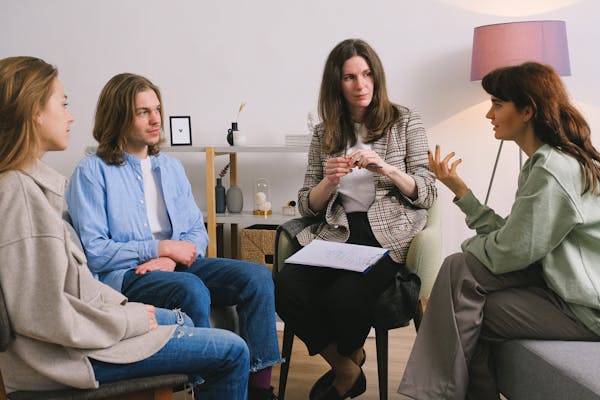
Groups
Group
We offer a variety of groups in both Virginia and Hibbing that are facilitated by our providers. To join most groups, you must have a comprehensive evaluation completed and be referred for services by a provider.
To find out if you are eligible for group therapy, call us at 218-749-2881 for assistance.
Group Schedule:
Dialectical Behavior Therapy (DBT): 18+
Tuesdays 1p.m.-2:30 p.m. Main/Virginia (in person)
With: Tod Swenson
Thursdays 1p.m.-3p.m. Main/Virginia (women’s group/in person)
With: Cassandra Kotnik and Cassie McDowell
Dialectical behavior therapy (DBT) is a type of talk therapy (psychotherapy). It’s based on cognitive behavioral therapy (CBT), but it’s specially adapted for people who experience emotions very intensely.
Cognitive behavioral therapy (CBT) is a type of talk therapy that helps people understand how thoughts affect emotions and behaviors.
“Dialectical” means combining opposite ideas. DBT focuses on helping people accept the reality of their lives and their behaviors, as well as helping them learn to change their lives, including their unhelpful behaviors.
Dialectical behavior therapy was developed in the 1970s by Marsha Linehan, an American psychologist.
Useful for:
Those with the following diagnosis, including but not limited to:
- Borderline personality disorder (BPD)
- Self-harm
- Suicidal behavior
- Post-traumatic stress disorder (PTSD)
- Substance use disorder
- Eating disorders, specifically binge eating disorder and bulimia
- Depression
- Anxiety
- Mindfulness, Interpersonal Effectiveness, Distress Tolerance, and Emotion Regulation
It’s important to note that the reason DBT has proved effective for treating these conditions is that each of these conditions is thought to be associated with issues that result from unhealthy or problematic efforts to control intense, negative emotions. Rather than depending on efforts that cause problems for the person, DBT helps people learn healthier ways to cope.
* Comprehensive Evaluation is required
*A referral from a Mental Health provider is required.
Mental Health Wellness Group: 18+
Wednesday 1p.m. – 3p.m. Main/Virginia (in person or telehealth)
With: Tod Swenson
Definition: Illness Management and Recovery (IMR) is an evidenced-based practice designed to provide mental health consumers with knowledge and skills necessary to cope with aspects of their mental illness while maintaining and achieving goals in their recovery. IMR is a curriculum in which a trained mental health practitioner or trained peer specialist uses psychoeducation, behavioral tailoring, relapse prevention training, and coping skills training to assist in symptom management and goal formulation.
Useful for:
The goals of IMR are:
- Learn about mental illnesses and strategies for treatment
- Understand the illness, including symptoms, possible course and probable long- and short-term outcomes
- Medication education, medication adherence, and symptom management
- Reduce relapse and re-hospitalizations by identifying early warning signs and developing a relapse prevention plan
- Learn to create networks of social support to enhance recovery
- Learn coping strategies for persistent symptoms
- IMR practitioners use a combination of motivational, educational, and cognitive-behavioral techniques. In this program mental health consumers learn to develop recovery goals as SMART Goals. That is, ensuring goals are Specific, Measurable, Achievable, Relevant and Time-Bound. SMART Goals assist clients in formulating specific goals that will build upon their current strengths and implementing a plan of action for goal achievement.
* Comprehensive Evaluation is required
*A referral from a Mental Health provider is required.
LGBTQIA?+ Acceptance Group: 18+
Tuesdays 3p.m.- 4p.m. Main/Virginia (in person)
With: Cassie McDowell
This Cognitive Behavioral Therapy (CBT) group focuses on learning skills to strive for LGBTQ empowerment. Its goal is to improve mental wellbeing, find your voice, and welcome self-expression. Through the support of the group, members strive for wellness with LGBTQ peers while embracing who they are as whole. The group works through common challenging issues that this community faces and the impact it has on their overall mental health.
Useful for:
- Those that need/want/desire support on their journey
- Resources
- An active ally
- An inclusive space to process concerns
- Skills on how to recognize and validate your own stressors
- Intentional, collaborative and holistic care
- Building connections
* Comprehensive Evaluation is required
*A referral from a Mental Health provider is required.
ARMHS Education Groups: 18+
ARMHS Education Groups are held at the William J. Bell location at 501 1st St. North, Virginia, MN or Govenor Rudy Perpich location at 3203 3rd Ave. W., Hibbing, MN.
To be referred a Comprehensive Evaluation must be completed and list a ARMHS referral, and referrals will need to have ARMHS intake completed.
Boundary Power- Tuesday’s 1pm-2pm (Aleda) held at the Bell location in Virginia
Women’s Group – Tuesday’s 1pm. – 2pm (Linda) at the Bell location in Virginia
WRAP- Tuesday’s 10:30am-12pm (Julie) at the Bell location in Virginia
Mindfulness Group – Tuesday’s 9am -10am (Nick) at the Perpich location in Hibbing
Men’s Group – Tuesdays 2pm – 3pm (Linda at the Bell location in Virginia
Aggression Management Group (Serena) at the Bell location in Virginia
11-week course starting February 29th
1pm – 2pm
This group is developed to help individuals understand and manage their emotions in healthier ways. The goal of this group is to provide a safe space where participants can learn strategies to manage anger, communicate more effectively, and reduce aggressive behaviors in all areas of life.
Sessions will include group discussions, interactive exercises, and personal reflection time. Participants will also receive practical tools and worksheets that can be used outside of the group to reinforce the lessons learned.
Group Locations:
William F. Sauvé Building
Main Building
624 13th St. S.
Virginia, MN 55792
Gov. Rudy Perpich Building
Perpich Building
3203 W. 3rd Ave
Hibbing, MN 55746
